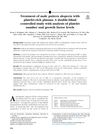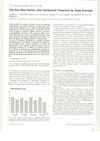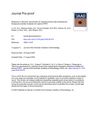 57 citations,
October 2018 in “Journal of The American Academy of Dermatology”
57 citations,
October 2018 in “Journal of The American Academy of Dermatology” Platelet-rich plasma treatment can significantly increase hair count and density in men with pattern baldness, and these improvements can last up to 3 months.
 51 citations,
December 2011 in “The Journal of Dermatology”
51 citations,
December 2011 in “The Journal of Dermatology” New treatments for severe hair loss often fail, but some patients see hair regrowth with specific therapies, and treatment should be tailored to the individual's situation.
[object Object] 36 citations,
December 2021 in “The journal of allergy and clinical immunology/Journal of allergy and clinical immunology/The journal of allergy and clinical immunology” Two drugs, ritlecitinib and brepocitinib, improved scalp hair loss condition markers.
 489 citations,
November 2021 in “Signal Transduction and Targeted Therapy”
489 citations,
November 2021 in “Signal Transduction and Targeted Therapy” The JAK/STAT pathway is important in cell processes and disease, and JAK inhibitors are promising for treating related conditions.
 54 citations,
March 1987 in “Journal of The American Academy of Dermatology”
54 citations,
March 1987 in “Journal of The American Academy of Dermatology” 3% topical minoxidil effectively treats extensive alopecia areata with few side effects.
 8 citations,
April 1988 in “Journal of endocrinological investigation”
8 citations,
April 1988 in “Journal of endocrinological investigation” Topical spironolactone cream doesn't cause hormone-related side effects in the body.
 8 citations,
September 1995 in “Acta Dermato Venereologica”
8 citations,
September 1995 in “Acta Dermato Venereologica” Calcipotriol treatment for scalp psoriasis does not cause hair loss.
 1 citations,
January 2017 in “Expert opinion on orphan drugs”
1 citations,
January 2017 in “Expert opinion on orphan drugs” Adalimumab is the most effective treatment for severe hidradenitis suppurativa, but more research is needed to improve treatment options.
 August 2023 in “International journal of research in dermatology”
August 2023 in “International journal of research in dermatology” Janus kinase inhibitors are effective and generally safe for treating hair loss in adults with alopecia areata.
 36 citations,
June 2014 in “Experimental Neurology”
36 citations,
June 2014 in “Experimental Neurology” Teriflunomide is an effective and generally safe oral treatment for relapsing MS, reducing relapses and slowing disability progression.
 20 citations,
December 2016 in “American Journal of Clinical Dermatology”
20 citations,
December 2016 in “American Journal of Clinical Dermatology” Men prefer less invasive cosmetic procedures and need different treatment approaches than women.
 9 citations,
December 2020 in “Dermatologic Therapy”
9 citations,
December 2020 in “Dermatologic Therapy” Certain drugs are effective for skin conditions like psoriasis, vitiligo, and hair loss.
 8 citations,
October 2022 in “Dermatology practical & conceptual”
8 citations,
October 2022 in “Dermatology practical & conceptual” Tofacitinib and ruxolitinib are effective and safe for treating various autoimmune skin and joint disorders.
 3 citations,
December 2016 in “Sexual medicine reviews”
3 citations,
December 2016 in “Sexual medicine reviews” The document concludes that better research methods are needed in men's sexual health to provide stronger evidence and improve patient care.
 1 citations,
January 2023 in “Przegląd Dermatologiczny”
1 citations,
January 2023 in “Przegląd Dermatologiczny” The Polish Society of Dermatology recommends treatments for alopecia areata that vary by severity, including topical and systemic medications, with long-term maintenance important for management.
 41 citations,
February 2021 in “Cureus”
41 citations,
February 2021 in “Cureus” Dutasteride treatment in men with mild to moderate COVID-19 reduced viral shedding, inflammation, and recovery time without serious side effects.
 December 2024 in “Frontiers in Neurology”
December 2024 in “Frontiers in Neurology” Testosterone with finasteride improved muscle and bone health in men with spinal cord injury.
 60 citations,
February 2010 in “Gynecological Endocrinology”
60 citations,
February 2010 in “Gynecological Endocrinology” Metformin combined with lifestyle changes improves insulin resistance and reduces testosterone levels in women with PCOS more than lifestyle changes alone.
 5 citations,
July 2021 in “medRxiv (Cold Spring Harbor Laboratory)”
5 citations,
July 2021 in “medRxiv (Cold Spring Harbor Laboratory)” Proxalutamide improved blood markers related to inflammation, immune response, and clotting in COVID-19 patients, potentially reducing hospitalizations.
 24 citations,
March 1987 in “Journal of The American Academy of Dermatology”
24 citations,
March 1987 in “Journal of The American Academy of Dermatology” Minoxidil 1% and 2% best promote hair growth and may prevent hair loss.
 April 2023 in “The journal of investigative dermatology/Journal of investigative dermatology”
April 2023 in “The journal of investigative dermatology/Journal of investigative dermatology” Ritlecitinib significantly improves scalp hair regrowth in alopecia areata patients over time.
 September 2019 in “Journal of Investigative Dermatology”
September 2019 in “Journal of Investigative Dermatology” Abrocitinib at 100 mg and 200 mg daily may significantly improve moderate-to-severe atopic dermatitis in patients 12 years and older.
 26 citations,
March 2007 in “Clinical and experimental dermatology”
26 citations,
March 2007 in “Clinical and experimental dermatology” Pimecrolimus cream is not effective for treating alopecia areata.
[object Object]  1 citations,
August 2020 in “Journal of The American Academy of Dermatology”
1 citations,
August 2020 in “Journal of The American Academy of Dermatology” The authors agree that standardizing how PRP methods are reported could help compare results, but note that the link between PRP's contents and hair growth is unclear, and recommend avoiding split-scalp designs in future trials.
 13 citations,
November 2012 in “Journal of The European Academy of Dermatology and Venereology”
13 citations,
November 2012 in “Journal of The European Academy of Dermatology and Venereology” Certain factors like allergies, nail problems, and hair loss patterns can predict how well someone with patchy hair loss will respond to skin cream treatments.
 2 citations,
July 2010 in “Clinical and Experimental Dermatology”
2 citations,
July 2010 in “Clinical and Experimental Dermatology” Delaying hair loss treatment reduces its effectiveness.
 May 1963 in “American journal of obstetrics and gynecology”
May 1963 in “American journal of obstetrics and gynecology” Injecting 2 ml of TEEV every 4 weeks is better because it has the same benefits but fewer side effects.
6 citations,
June 2021 in “EClinicalMedicine” ALRV5XR significantly improves hair density in women with hair loss and is well-tolerated.
3 citations,
September 2021 in “EClinicalMedicine” ALRV5XR effectively increases hair density in men with androgenetic alopecia without adverse effects.
 4 citations,
March 2016 in “Dermatologic Surgery”
4 citations,
March 2016 in “Dermatologic Surgery” PRP treatment increased hair density, especially in men and younger patients with AGA.


























